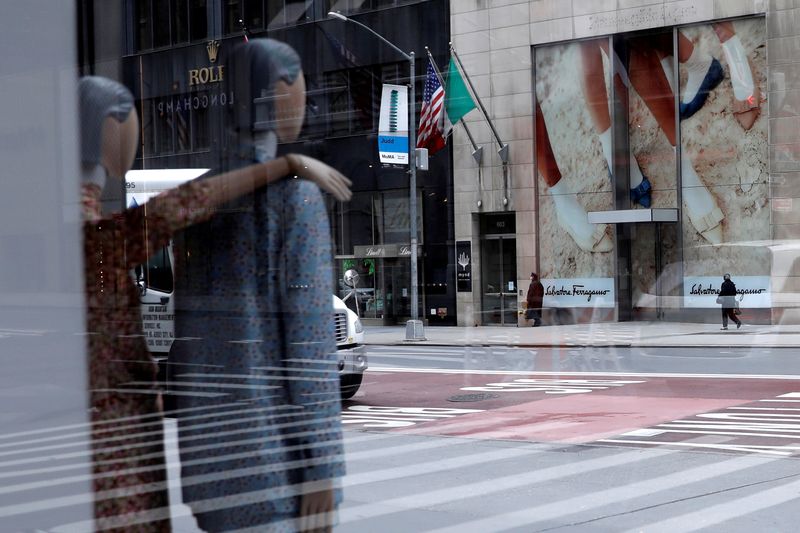By Lucia Mutikani
WASHINGTON (Reuters) - U.S. consumers cut spending by the most on record for the second straight month in April while boosting savings to an all-time high, and the growing frugality reinforced expectations the economy could take years to recover from the COVID-19 pandemic.
The report from the Commerce Department on Friday also showed an economy highly reliant on the government, with financial aid checks from a historic fiscal package worth nearly $3 trillion driving a record surge in personal income.
Together with news that monthly exports collapsed, the report left economists anticipating the largest contraction in gross domestic product in the second quarter since the Great Depression. Data has also been dismal this month on the labor market, manufacturing production and homebuilding.
"Right now, the economy is totally dependent upon the largesse of the government," said Joel Naroff, chief economist at Naroff Economics in Holland, Pennsylvania. "Will the federal government keep sending out checks or will the household and business welfare payments dry up?"
The Commerce Department said consumer spending, which accounts for more than two-thirds of U.S. economic activity, plunged 13.6% last month, the biggest drop since the government started tracking the series in 1959. It eclipsed the previous all-time decrease of 6.9% in March.
Economists polled by Reuters had forecast consumer spending would plummet 12.6% in April. Spending was depressed by a decrease in outlays on healthcare as dental offices closed and hospitals postponed elective surgeries and non-emergency visits to focus on patients suffering from COVID-19.
The disease has killed over 100,000 people in the United States, the highest death toll in the world.
Spending declined at restaurants, which have shifted to delivery and pick-up service only, and hotels and motels. Spending on food and beverages fell in April.
WELFARE ECONOMY
But the COVID-19 crisis boosted incomes for consumers in April, with the government transferring an additional $3 trillion to households. It doled out one-time $1,200 checks to millions of people and boosted unemployment benefits for the roughly 31 million out of work to cushion against economic hardship wrought by the pandemic.
Personal income surged a record 10.5% last month. Without the government money, income would have declined 6.3% with business closures pushing wages down 8.0%. The unprecedented economic upheaval saw the saving rate hitting a record 33%.
"If the economy reopens quickly without consequence, the millions who lost jobs are hired back and have no reason to fear they will lose their jobs again, these savings represent considerable spending power in the second half," said Chris Low, chief economist at FHN in New York.
"If it takes longer to reopen the economy, these savings will be used for sustenance over the next few months. They will limit the decline, but not fuel a sharp rebound."
The economy is gradually reopening after nonessential businesses were shuttered in mid-March to slow the spread of COVID-19, raising hope the economic slump was bottoming. A survey on Friday showed consumer sentiment stable in May.
Stocks on Wall Street fell as investors braced for a U.S. response to China's national security law on Hong Kong. The dollar was steady against a basket of currencies, while U.S. Treasury prices rose.
In a second report on Friday, the Commerce Department said goods exports tumbled 25.2% to $95.4 billion in April, a 10-year low. The broad decline in exports was led by a 65.9% collapse in shipments of motor vehicles and parts. That outpaced a 14.3% tumble in imports. As a result, the goods trade deficit widened 7.2% to 69.7 billion last month.
The larger goods trade deficit is likely a drag on second GDP, which economists expect could drop at as much as a 40% rate, a pace not seen since the 1930s.
The economy contracted at a 5.0% annualized rate last quarter, the deepest pace of decline in GDP since the 2007-09 recession. Consumer spending tumbled at a 6.8% rate, the sharpest drop since the second quarter of 1980.
With consumer spending depressed in April, inflation pressures were weak. The personal consumption expenditures (PCE) price index excluding the volatile food and energy components fell 0.4%. That was the largest drop since September 2001 and followed an unchanged reading in March.
In the 12 months through April, the so-called core PCE price index rose 1.0%, the smallest gain since December 2010 which followed a 1.7% increase in March. The core PCE index is the Federal Reserve's preferred inflation measure. The U.S. central bank has a 2% inflation target.
"The core PCE decline reflects some big collapses in the prices of a limited number of the most-affected services," said Andrew Hunter, a senior U.S. economist at Capital Economics. "It is not evidence of a widespread Japanese-style deflation ensnaring America."
